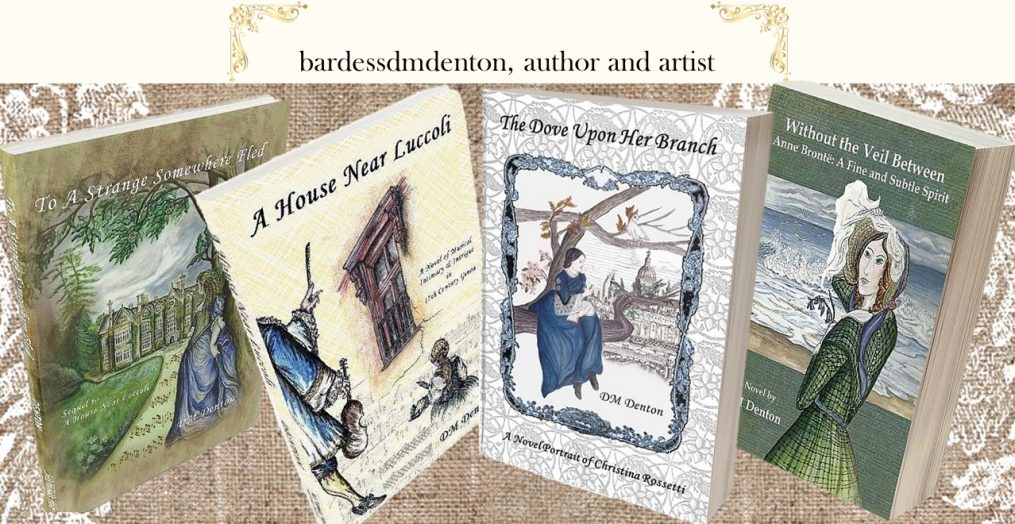
Today, July 30, 2019, marks the 201st anniversary of the birth of Emily Brontë. Last year’s bicentennial was, of course, awash in commemorations and celebrations at the Brontë Parsonage Museum in Haworth, West Yorkshire and elsewhere, including all over the internet. But, as I’m sure many others feel, Emily’s natal day should always be marked with enthusiasm and gratefulness, for it gave us one of the most uniquely fearless, impassioned, enigmatic, and elusive poets and novelists of all time.
Long after all the Brontë sisters had died, Charlotte’s friend Ellen Nussey wrote in Reminisces of Charlotte Brontë that “[Emily] and Anne were like twins – inseparable companions, and in the very closest sympathy, which never had any interruption.”
This closeness became more and more palpable as I progressed along the path of research and writing Without the Veil Between, Anne Brontë: A Fine and Subtle Spirit.

Illustration by DM Denton from Without the Veil Between
Emily was as essential to Anne as Anne was to Emily, whether she and Anne were together at Haworth, on an excursion to York, or physically apart like when Emily was at school in Brussels or Anne was working as a governess. They invigorated each other’s imagination, offered a sense of belonging, and balanced each other’s strengths and weaknesses. The ethereal essence of their connection was enough to overcome their growing apart when it came to the fantasy writing that had bonded them as children and adolescents.
Emily never stopped being an imaginative and liberating influence on dutiful, devout Anne, a constant and protective best friend who by example more than precept reminded her youngest sister to leave at least some of her spirit unfettered and even encouraged her to now and then step out of life’s responsibilities and live a little wildly.
O come with me, thus ran the song,
The moon is bright in Autumn’s sky,
And thou hast toiled and laboured long
With aching head and weary eye.
~ From O Come With Me by Emily Brontë
Anne’s influence on Emily was less obvious, easier to view Emily as more akin to nature and mystery than real people, floating untethered in her own self-created, solitary, independent, irreligious orbit. For me, all of that remains true while, at the same time, I feel Emily was deeply attached to Anne: that she admired her level-headedness and faith-filled, forgiving, moralistic, yielding yet strong nature, and valued her opinion, especially creatively.
Anne was a safe haven where Emily could rely on something besides her own fortitude and segregation. Anne was someone who understood her and had no wish to change her.
There was profound understanding and acceptance, truth and endurance in the love each had for the other.

What better way to enjoy time with Emily again than by resuming their habit of wandering west to meet only earth and sky. Their dogs, like themselves, with contrasting physiques and personalities, were intrinsically similar, especially in their need to frequently escape the stuffiness and limited amusement of being indoors.
“Flossy, come back,” Anne tried to command the impulsive spaniel off once more to chase sheep.
Emily had no trouble getting Keeper to lie down with a firm annunciation of his name while she pointed to the ground, although his whimpering implied he was still thinking about following Flossy’s example.
“Flossy. Bad boy, bad boy.”
“If you control your little Robinsons like you do that sassy mutt, I fear they won’t live long.”
As if it heard Emily’s prediction, a large ewe turned on Flossy, which brought the dog running back up the steep slope to his forgiving mistress.
On second thought, Anne tried to be tougher with a disciplinary tap on Flossy’s nose, then embraced him again. “Good boy.”
“Methinks he’s exactly what you always wanted … to be.” Emily was walking again, her direction declaring her destination. Their ascent to Top Withens would be delayed an hour or more, if Emily’s mood was more for reclining and swirling her hand in the water to stir up tadpoles.
When Ellen Nussey was with them, from crossing the slabbed bridge over Sladen Beck to climbing a rugged bank, navigating greasy stones and not minding a little dampening, there was always an echo of “watch your step”. With just Anne and the dogs following her lead, Emily didn’t have anything to say until they were at the best seat in view of the waterfall.
“No, you take it, Annie. I relinquish my throne to you.”
“Any of the other stones would do for me.”
“I insist on taking care of you.”
Anne didn’t mind Emily acting more like an older brother than Branwell ever did, or even a gallant lover, reminiscent of childish acting-out. In truth, she depended on it. In that small oasis of time, standing still where they were hidden from the world, their faithful companions conspiring to find something to occupy themselves, there was so much to enjoy and be grateful for. The sky was open in sight of heaven, high ground around and beyond them, the sun warming and a breeze cooling, the sound of water calming, and faintly fragrant moss glistening on the rocks with tiny white stars appearing between some of them.
Yet, more as if she was on a stormy ocean than in a quiet cove, panic overwhelmed Anne until she could hardly breathe.
Emily lightly rubbed Anne’s back and twisted up a strand of her hair loosened from its simple arrangement.
Anne cleared her throat, choking, Flossy pawing at her knees, Keeper barking.
“Go ahead and spit.” Emily helped her sister lean over to do so. “Other than me, there’s only the dogs, flies, tadpoles and, perhaps, God to witness it.”
Anne laughed and spoke hoarsely, “What would I do without you?”
“Better than I have done without you.”
From Without the Veil Between, Anne Brontë: A Fine and Subtle Spirit
